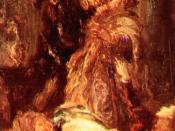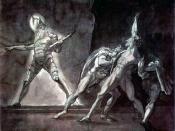UNPACK MY HEART WITH WORDS
Words, words, words.
Saying something and then actually doing it is a rare event in today's society. Unfortunately, staying true to our word has been a problem for many years now. William Shakespeare's Hamlet perfectly illustrates this through the powerful protagonist of Hamlet whose passion is to think rather than act. After discovering that his father was murdered by the adulterate beast of Claudius, Hamlet feigns antic disposition in an attempt to hide his true intentions to kill the newly-crowned king (I.v.47,190).
Despite Claudius' earlier statement that madness in great ones must not unwatched go, his predisposition of feeling insecure causes him to send Hamlet to England (III.i.201). On his way to England, Hamlet comes across Fortinbras, the Prince of Norway, leading his army of lawless resolutes to fight over a worthless patch of ground (I.i.110). Fortinbras' willingness to act spurs Hamlet into his final soliloquy:
How all occasions do inform against me,
And spur my dull revenge.
What is a man,
If his chief good and market of his time
Be but to sleep and feed? A beast, no more.
Sure, he that made us with such large discourse,
Looking before and after, gave us not
That capability and god-like reason
To fust in us unused. Now, whether it be
Bestial oblivion, or some craven scruple
Of thinking too precisely on the event.
How stand I then,
That have a father killed, a mother stained,
And let all sleep, while, to my shame I see
The imminent death of twenty thousand men,
That, for a fantasy and trick of fame,
Go to their graves like beds, fight for a plot
Whereon the numbers cannot try the cause,
O, from this time forth,
My thoughts be bloody or be nothing worth! (IV.iv.34ff)...


